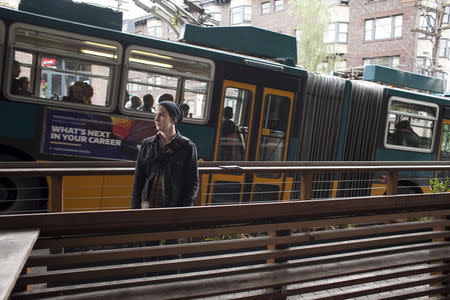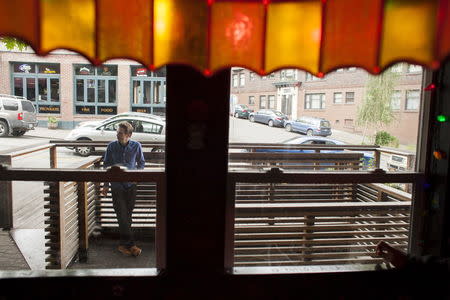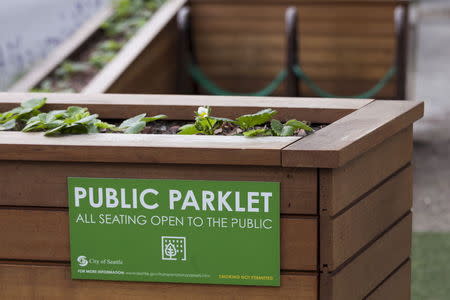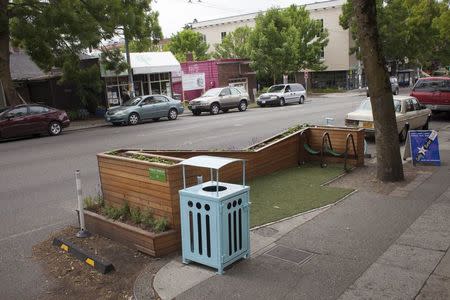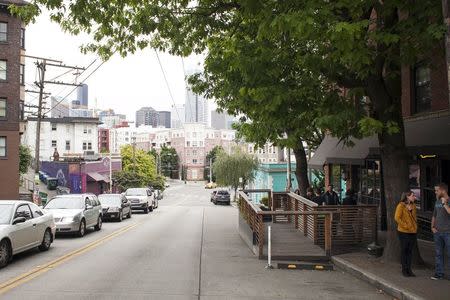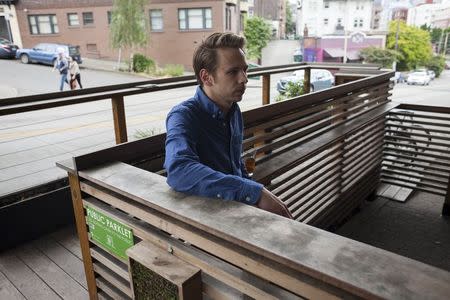Seattle adds 'streateries' to America's growing pavement culture
By Eric M. Johnson
SEATTLE (Reuters) - A hipster group hug, a man cradling a Chihuahua named Frankie, and a woman's cheerleader routine stand out amid the booze and midnight revelry on a packed Seattle street patio a bartender describes as a "human corral."
The box-shaped wood-frame patio, which juts out into a traffic-clogged roadway in the densely populated Capitol Hill neighborhood, is one of Seattle's "parklets," with a segment set aside for alcohol consumption.
Under a new city program, it will be converted this summer into one of eight "streateries," with its entire space opened to microbrew-sipping patrons.
The street eateries are platformed oases with decorative shrubs that semi-permanently usurp one or two parking spaces. Some will be affiliated with restaurants ranging from a taco joint to a posh Middle Eastern restaurant, where servers can bring food and drink to customers seated at tables.
After the businesses close, the spaces will revert to parks open to the public.
"American cities really want to activate the public spaces and streets that for way too long have been given over to the automobile," said Anastasia Loukaitou-Sideris, a professor at the University of California Los Angeles, who studies the phenomenon.
"The streateries and parklets are part of this mentality of 'reclaiming our streets for people,'" she said.
Seattle is among many U.S cities including New York, Los Angeles and Chicago, experimenting with programs that transform curbside parking spaces for public use.
The coast-to-coast movement is traced to the now global annual PARK(ing) Day, launched in San Francisco in 2005, in which artists and residents temporarily transform metered parking spaces into compact patios, gyms or gardens.
Supporters say such reclamation taps into a neighborhood's vibrancy, adds greenness or a sleek structure to often drab environs, and offers a venue for community togetherness.
Among signs of urban reclamation, the Capitol Hill parklet outside the crowded bar has streaks of graffiti on its wood frame, and a deck dotted with cigarette butts, despite a NO SMOKING sign.
About a mile (1.6 km) away, cookie shop owner Robin Wehl Martin, whose customers spill onto the sidewalk some nights, said she too wanted to open a parklet: "With neighbors meeting there and being so social, we want to give them more room."
STREET SEATS
Opponents decry greater congestion in dense city pockets and the loss of parking, but also voice concerns about noise, trash and car collisions. A drunken driver plowed into a Los Angeles parklet last summer, although no one was hurt.
Some worry the structures will draw homeless people or drug users, and a local radio host slammed the concept as "symptomatic of Seattle's anti-car bias."
Ian Eisenberg, a merchant in one gentrifying Seattle neighborhood said he joined other business owners in signing a petition against a parklet outside a nearby cafe.
"We are a fledgling business district that's kind of going through a growth spurt right now and people still drive here and parking is becoming a real problem," Eisenberg said.
Another parklet, proposed by a nearby beer emporium, was abandoned after residents and businesses objected, Eisenberg said.
Despite opposition, compact parks with built-in seating have arisen in many North American cities, from Portland's "Street Seats" and Montreal's "Terrasses" to Philadelphia's seasonal parklets, which revert to parking during colder months.
They appeal to businesses that want to draw more customers, with units costing about $30,000 to $100,000 to build, Loukaitou-Sideris said.
The streateries built under Seattle's pilot program, announced in April, will be "evaluated throughout the year" before becoming permanent.
To get a streatery permit, merchants must submit an application that demonstrates community support. They also pay the city about $4,200 annually to convert one metered parking space.
"I've hung out in them here and in Chicago," said Scott Kubly, Seattle's transit director. "We get a community-driven public space. We get a more vibrant streetscape, and it's all happening at no cost to the city."
(Reporting by Eric M. Johnson in Seattle; Editing by Cynthia Johnston and Peter Cooney)
